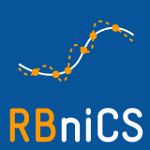RBniCS Project¶


Description¶

The RBniCS Project contains an implementation in FEniCS of several reduced order modelling techniques (and, in particular, certified reduced basis method and Proper Orthogonal Decomposition-Galerkin methods) for parametrized problems. It is ideally suited for an introductory course on reduced basis methods and reduced order modelling, thanks to an object-oriented approach and an intuitive and versatile python interface. To this end, it has been employed in several doctoral courses on “Reduced Basis Methods for Computational Mechanics”.
RBniCS can also be used as a basis for more advanced projects that would like to assess the capability of reduced order models in their existing FEniCS-based software, thanks to the availability of several reduced order methods (such as reduced basis and proper orthogonal decomposition) and algorithms (such as successive constraint method, empirical interpolation method) in the library.
Several tutorials are provided. This software is also a companion of the introductory reduced basis handbook:
Timeline and funding¶
2015 |
Early development of RBniCS begins at SISSA mathLab. |
2016-2021 |
Financial support of the AROMA-CFD H2020 ERC CoG project (PI: Prof. Gianluigi Rozza, host: SISSA mathLab) for the consolidation of RBniCS development. |
2020-2022 |
Financial support of the NA-from-PDEs PRIN MIUR project (PI: Prof. Gianluigi Rozza, unit: SISSA mathLab) for the continuation of RBniCS development. |
2021 |
Università Cattolica del Sacro Cuore joins the development. SISSA mathLab and Università Cattolica del Sacro Cuore are now partner institutions in the development of RBniCS. |
2024 |
Handbook based on RBniCS is published within the SISSA Springer Series. |
Learn more about RBniCS¶
License¶
Like all core FEniCS components, RBniCS is freely available under the GNU LGPL, version 3.